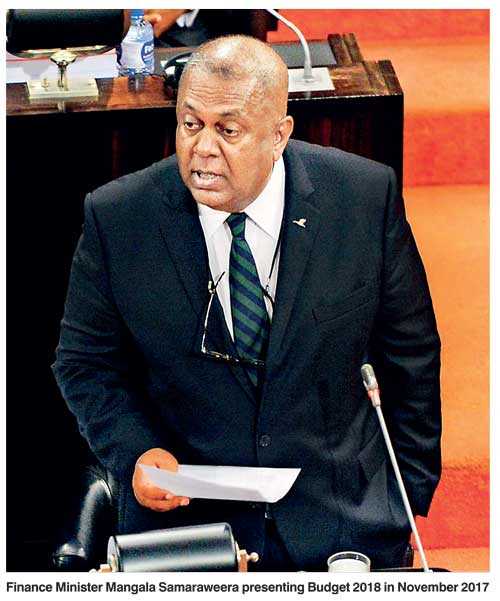Thursday Feb 19, 2026
Thursday Feb 19, 2026
Tuesday, 9 October 2018 00:00 - - {{hitsCtrl.values.hits}}
The budget speech is just a month away and it has not got off to the best of starts in the form of the Appropriation Bill released recently. Seeing just one line – “budget deficit would be curtailed to Rs. 644 b, 4.1% of GDP” – is sufficient to be somewhat sceptic.
Numbers in Appropriation Bill make little sense
The budget speech in November 2016 estimated a budget deficit of Rs. 625 b for 2017. When the Central Bank Annual Report was released last April, it showed that the budget deficit in 2017 was Rs. 733 b. Over Rs. 100 b higher than the original estimate. While the budget speech in November 2017 estimated a budget deficit of Rs. 675 b for 2018, the latest data up to June shows the budget deficit has expanded from last year. This point to the budget deficit being well over Rs. 733 b in 2018.
Reducing the budget deficit by around Rs. 100 b in 2019 (to reduce it to Rs. 644 b) is impossible. On one hand the slowness in economy would pull back tax revenue or trying to raise further taxes would further cripple an already sluggish economy. On the other hand, the Government is unlikely to reduce expenditure with major elections due in near future.

The poor structure of budget speeches
The budget speeches over the years have moulded into something that’s not worth listening to.
The beginning is usually to praise the Government and to bash the Opposition. Then a long list of minor proposals and a wish list is narrated while many in the Parliament fall asleep. The public is also not interested in the bulk of the speech except for an item or two that could be directly relevant to them.
In the end, the Government praises it while the Opposition condemns it and inexperienced analysts release research reports wholeheartedly believing in what was told with no evaluation of whether they have delivered on earlier promises. The more experienced observers would wait until the annexures to the speech are released (way after the speech has concluded) to get an understanding of what has happened in terms of revenue and expenditure proposals.
How an informative budget speech could start
A meaningful budget speech could commence reminding the salient points that was proposed at the previous year’s budget and a short appraisal of what was actually achieved – in quantifiable terms (not vague qualitative statements).
It should also highlight what could not be achieved and also any change of course based on what transpired during the year. It would always give comfort and credibility to investors and public when a Government is aware of its mistakes or the changing global landscape and is willing to adjust path swiftly.
What the budget speech should address
Ideally, the budget speech should indicate the Government’s measures during the year in order to drive the country towards the long term objective. Therefore having a clear long-term vision for the country is essential to prepare a rational annual budget. The budget every year should be a step forward in taking towards the end goal, rather than a short-term exercise to balance income and expenditure.
The absence of a long-term plan is the reason why proposals from one year to the next has no connection or continuity and on the contrary, sometimes even contradicts. The short-term fire-fighting mindset leaves no room for a long-term vision to be implemented. The 10 year plans in China are well known, but every year a gradual and a quantifiable step is taken forward to achieve the objective by the 10th year.
An example of a budget proposal
Let’s say the long-term objective is to increase foreign currency earnings by multiple times. A broad proposal could be to allocate 1% of tax revenue, say Rs. 20 b p.a. to achieve that objective. A specific proposal for the coming year would be to set up a modern IT college capable of turning out 10,000 top quality IT graduates annually (this is just a hypothetical example, clearly the industry should be consulted prior to such a proposal).
Then in the next year’s budget speech it should be disclosed what quantifiable progress was made in this regard and by when the proposal would be achieved and whether there is any change of course or any challenges faced during the year.
In contrast, did anyone hear about the progress made in terms of the EXIM Bank or the International Financial Centre that was proposed several years ago??
A reassuring ending to a budget speech
The budget speech should be short while capturing the salient points, so that the listeners could grasp the key measures. What could be achieved in a year is limited, so one has to be reasonable to set achievable targets. The infamous lengthy speech several years ago with the long list of proposals ended the year by achieving almost nothing that was proposed.
It could conclude with an indication of what could be expected in the following year’s budget (2019 November) which also gives the confidence to both investors and public that there is continuity and a clear long term plan.
No prizes for guessing what we will get on 5 November.
(The writers can be contacted via [email protected])